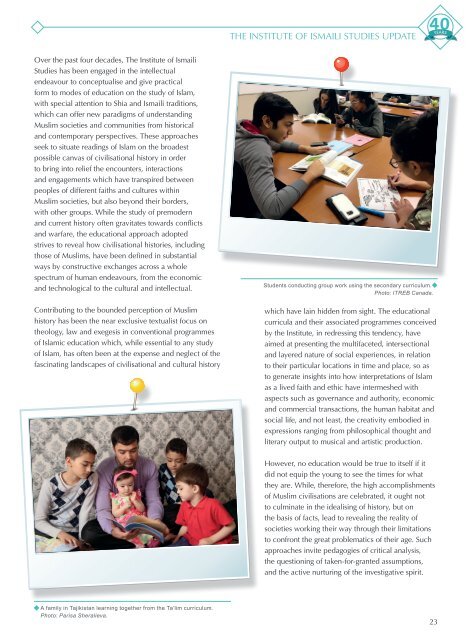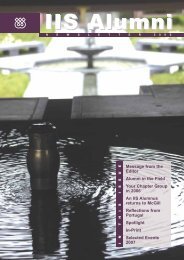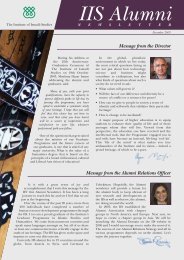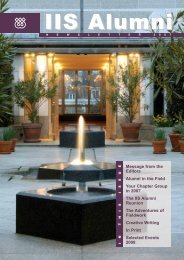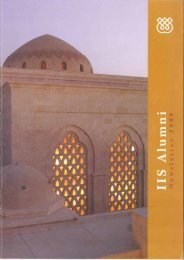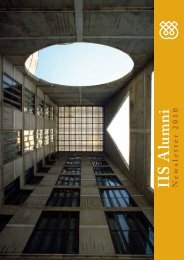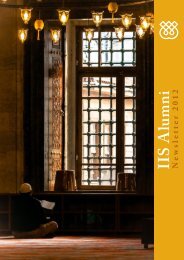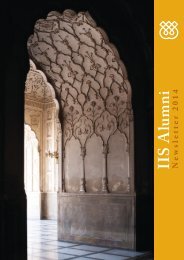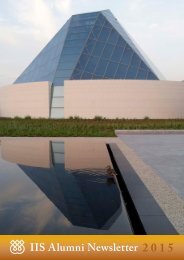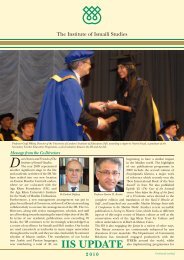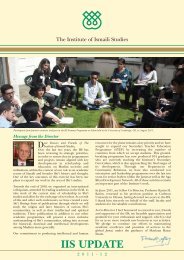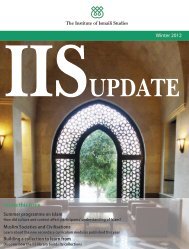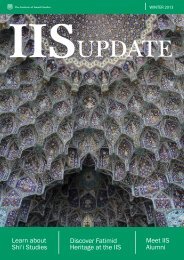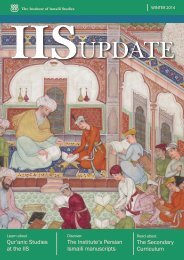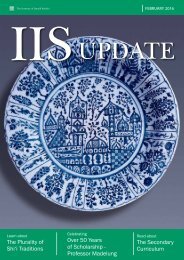IIS Update 2018
A special fortieth anniversary edition of IIS annual magazine.
A special fortieth anniversary edition of IIS annual magazine.
Create successful ePaper yourself
Turn your PDF publications into a flip-book with our unique Google optimized e-Paper software.
THE INSTITUTE OF ISMAILI STUDIES UPDATE<br />
40<br />
YEARS<br />
Over the past four decades, The Institute of Ismaili<br />
Studies has been engaged in the intellectual<br />
endeavour to conceptualise and give practical<br />
form to modes of education on the study of Islam,<br />
with special attention to Shia and Ismaili traditions,<br />
which can offer new paradigms of understanding<br />
Muslim societies and communities from historical<br />
and contemporary perspectives. These approaches<br />
seek to situate readings of Islam on the broadest<br />
possible canvas of civilisational history in order<br />
to bring into relief the encounters, interactions<br />
and engagements which have transpired between<br />
peoples of different faiths and cultures within<br />
Muslim societies, but also beyond their borders,<br />
with other groups. While the study of premodern<br />
and current history often gravitates towards conflicts<br />
and warfare, the educational approach adopted<br />
strives to reveal how civilisational histories, including<br />
those of Muslims, have been defined in substantial<br />
ways by constructive exchanges across a whole<br />
spectrum of human endeavours, from the economic<br />
and technological to the cultural and intellectual.<br />
Contributing to the bounded perception of Muslim<br />
history has been the near exclusive textualist focus on<br />
theology, law and exegesis in conventional programmes<br />
of Islamic education which, while essential to any study<br />
of Islam, has often been at the expense and neglect of the<br />
fascinating landscapes of civilisational and cultural history<br />
Students conducting group work using the secondary curriculum.<br />
<br />
which have lain hidden from sight. The educational<br />
curricula and their associated programmes conceived<br />
by the Institute, in redressing this tendency, have<br />
aimed at presenting the multifaceted, intersectional<br />
and layered nature of social experiences, in relation<br />
to their particular locations in time and place, so as<br />
to generate insights into how interpretations of Islam<br />
as a lived faith and ethic have intermeshed with<br />
aspects such as governance and authority, economic<br />
and commercial transactions, the human habitat and<br />
social life, and not least, the creativity embodied in<br />
expressions ranging from philosophical thought and<br />
literary output to musical and artistic production.<br />
However, no education would be true to itself if it<br />
did not equip the young to see the times for what<br />
they are. While, therefore, the high accomplishments<br />
of Muslim civilisations are celebrated, it ought not<br />
to culminate in the idealising of history, but on<br />
the basis of facts, lead to revealing the reality of<br />
societies working their way through their limitations<br />
to confront the great problematics of their age. Such<br />
approaches invite pedagogies of critical analysis,<br />
the questioning of taken-for-granted assumptions,<br />
and the active nurturing of the investigative spirit.<br />
A family in Tajikistan learning together from the Ta‘lim curriculum.<br />
Photo: Parisa Sheralieva.<br />
23


